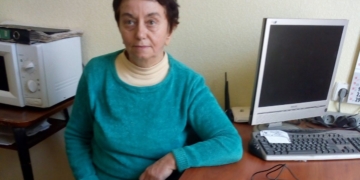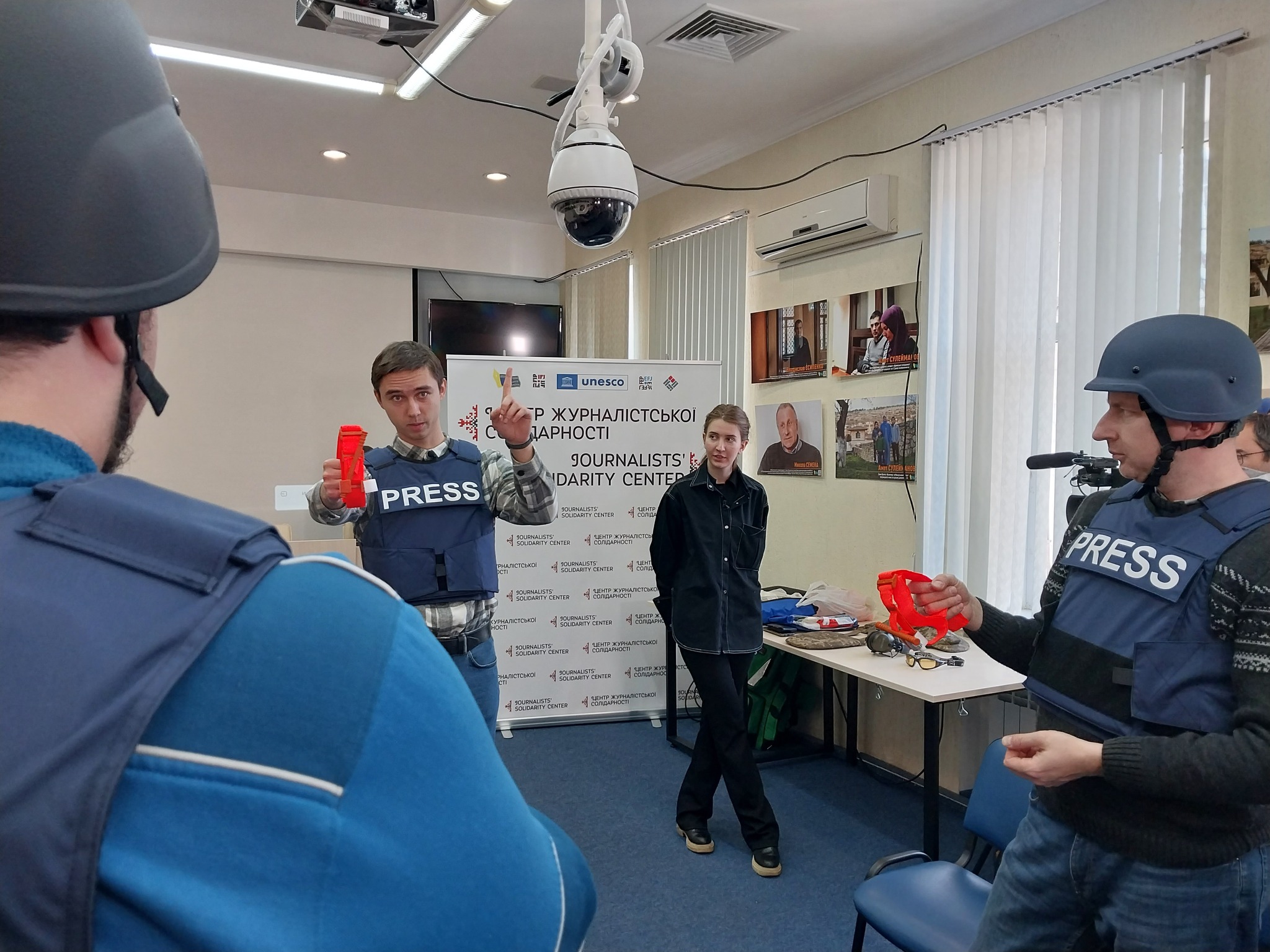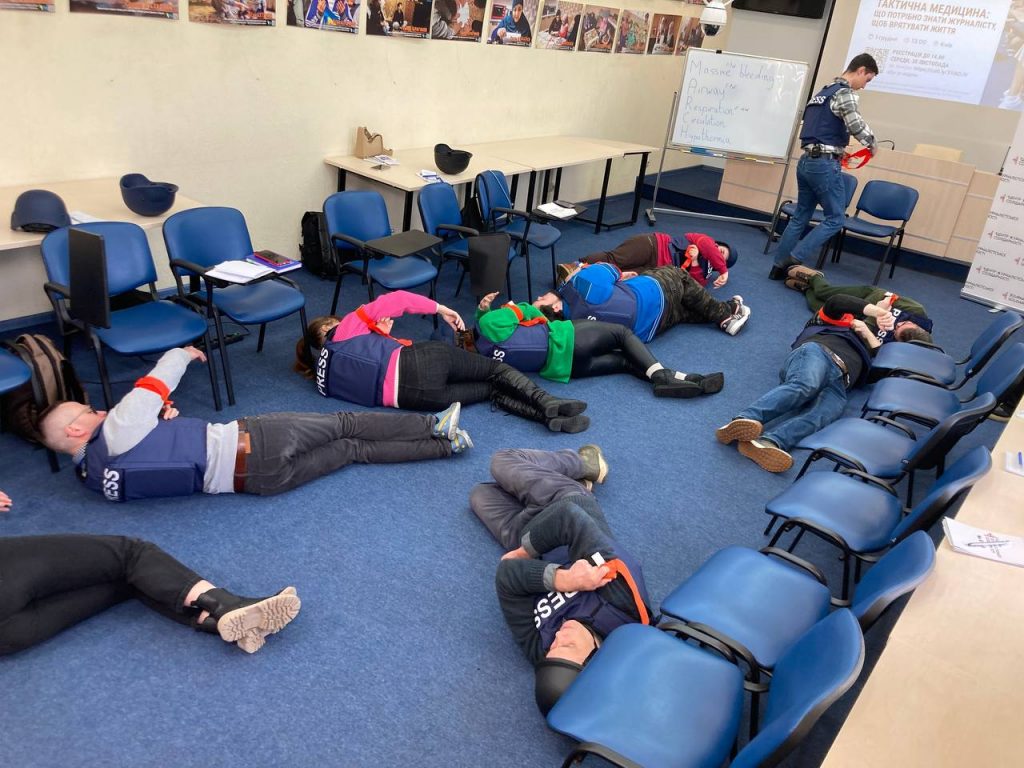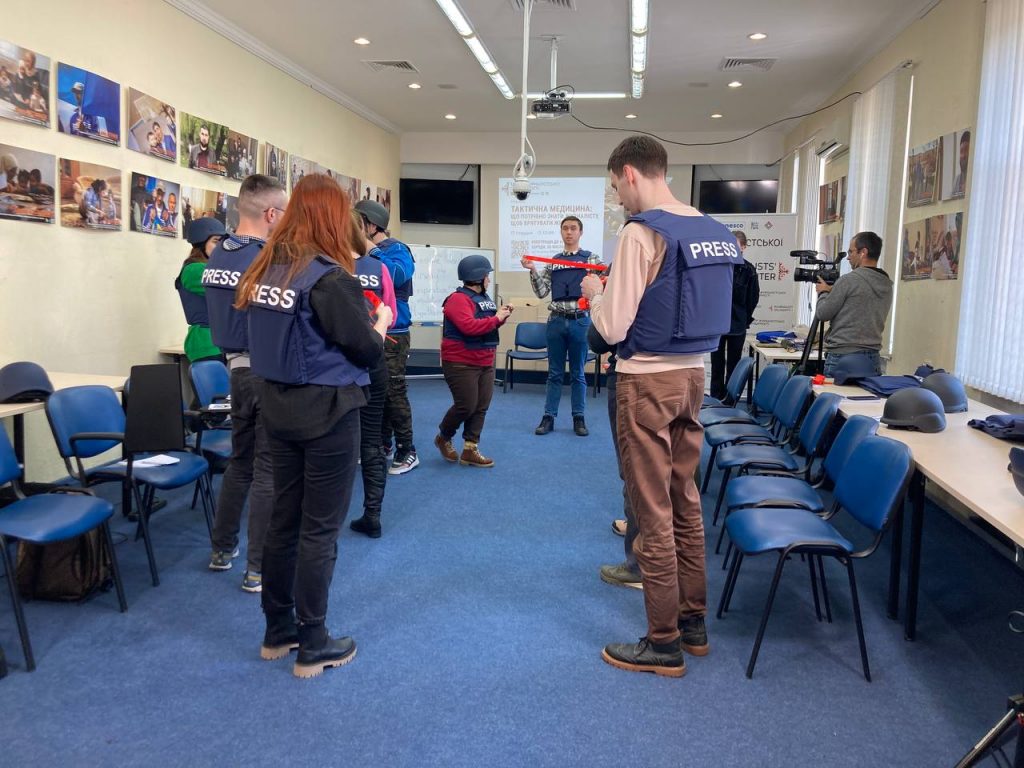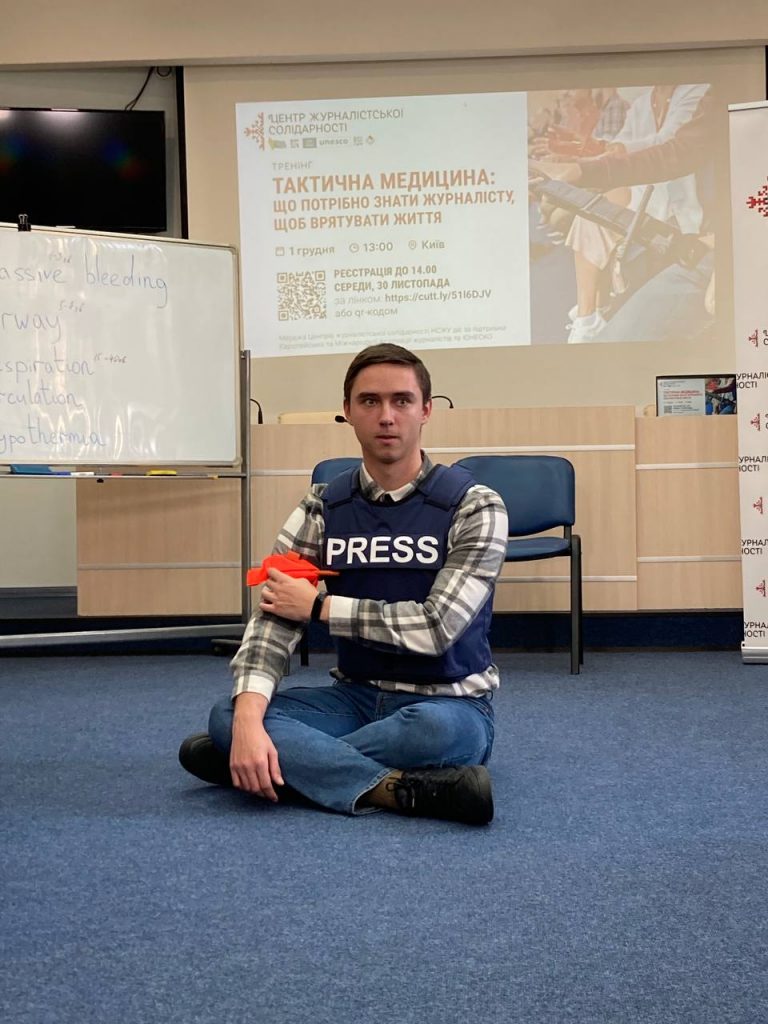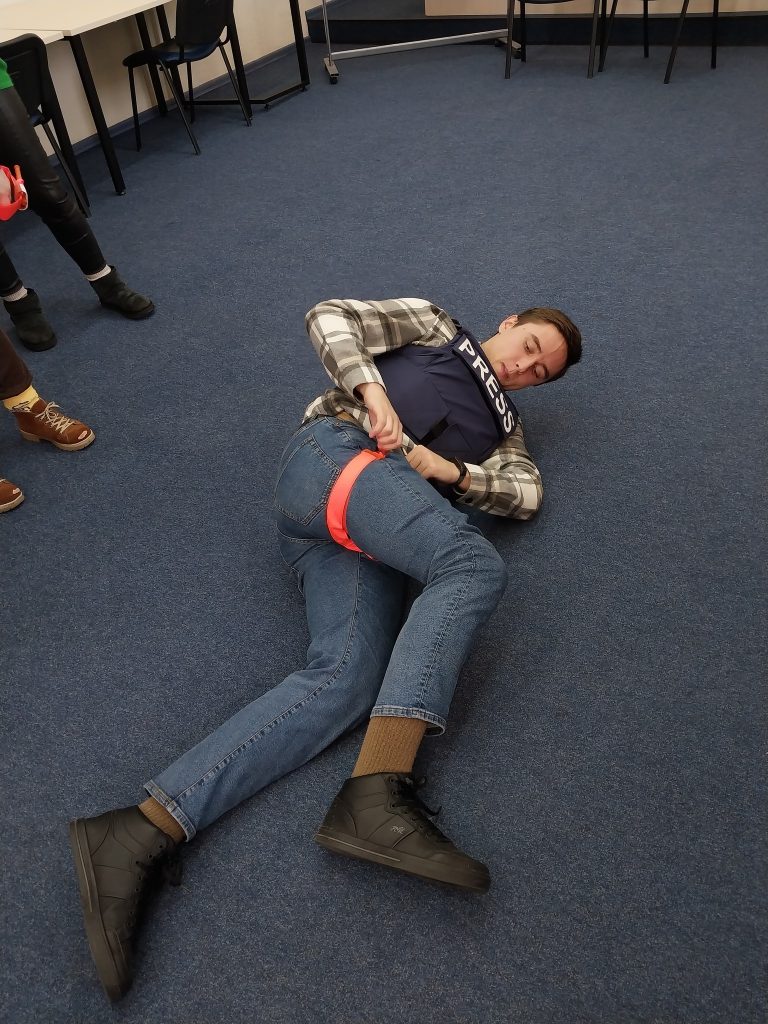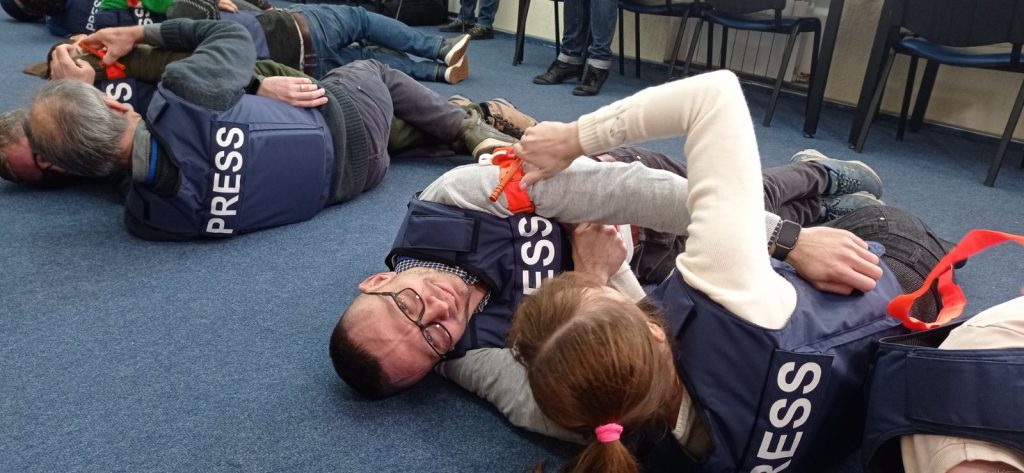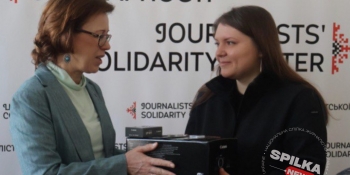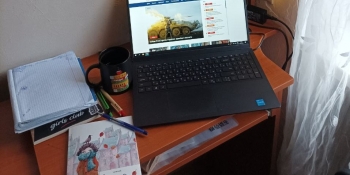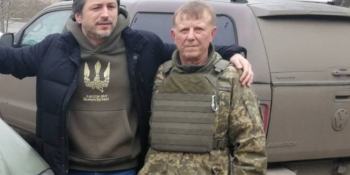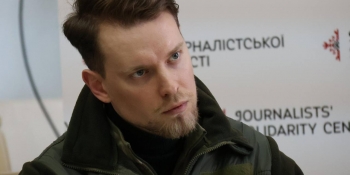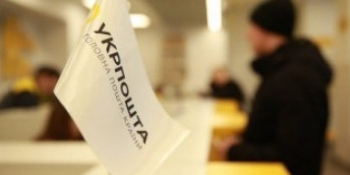This is the first educational meeting from the cycle of safety trainings for mass media workers held by the network of Centers for Journalist Solidarity of the National Union of Journalists of Ukraine with the support of UNESCO.
Journalism in Ukraine today is one of the most dangerous professions. Sometimes, in order to tell society important information, you have to risk your life. Such risks are especially exacerbated when reporters go to the front line or to recently de-occupied settlements. In order to save their lives, they must possess the basic skills of tactical medicine.
Ukrainian journalists received this knowledge during the training entitled Tactical Medicine: What a Journalist Needs to Know to Save a Life, which was conducted by certified instructors Volodymyr Romanchuk and Nataliya Hurinenko, who passed the course on providing first aid from Warmed, as well as the certification of an American TCCC coordinator in Ukraine. Volodymyr and Natalia trained about 40 trainers and taught courses for 10,000 Ukrainians.
“Today is the first large-scale event dedicated to the safety of journalists as part of the cooperation of the National Union of Journalists of Ukraine, the International Federation of Journalists and UNESCO. This is a very important training, because under the circumstances that have become a reality today, our fellow journalists need to have knowledge of basic tactical care in order to help themselves and their colleagues if necessary,” said Sergiy Tomilenko, the President of the NUJU, in his congratulatory speech.
During the training, the participants got acquainted with the peculiarities of the MARCH medical protocol, where each letter of the acronym indicates one or another danger (Massive Bleeding – Airway – Respiration – Circulation – Head injury / Hypothermia).
In the combat zone, one of the most dangerous types of injuries is massive blood loss. Volodymyr Romanchuk noted that with such an injury, a person can die in a matter of minutes.
“Massive bleeding is the most dangerous killer. It kills in 1-3 minutes if you have an important artery damaged. If you lose consciousness in 40-50 seconds, you die in 2-3 minutes,” said Volodymyr Romanchuk.
After a short theoretical base, the training participants moved on to practice – applying tourniquets to stop bleeding on the arms and legs in different positions. The main thing in this case is efficiency, says the coach. In order to bring the training conditions as close as possible to the real ones, the media workers performed exercises in PRESS body armor and helmets from UNESCO and the IFJ, provided by the protective equipment rental office of the Kyiv Center of Journalist Solidarity.
“If we are used to buy fashionable gadgets, how can we economize on life? Don’t spare money, buy yourself a tourniquet, or better – four tourniquets. Because you have four limbs,” said trainer Nataliya Hurinenko.
In addition to how to apply a tourniquet on a wounded person, the journalists were instructed on what is necessary for working in a combat zone.
“If you are going to the front line, a helmet and a bulletproof vest are good. But look at the first aid kit. There should be tourniquets, blood-colored gloves, hemostatic bandage, scissors, a marker, bandage, thermal blanket, two occlusive stickers, nasopharyngeal tube + lubricant, additional gauze bandages, reinforced tape. It is desirable to have all this in the amount of 2-3 pieces each. All these things must be certified. Don’t skimp, because it will save your life. Having a first aid kit and thinking that you will be saved is a self-deception, a myth. You need to have knowledge,” Volodymyr Romanchuk emphasized.
The participants of the training, among whom were also experienced colleagues – editor-in-chief of the online publication Glavkom Mykola Pidvezianyi and host of the telethon Yedyni Novyny Dmytro Chystiakov, journalist of the Svoi.City publication Hanna Kurtsanovska and other media workers, received certificates of completion of the basic course in tactical medicine.
“It is a very important topic. Today, every civilian Ukrainian should possess these skills, but journalists are the first to do so. We are in a hurry to be the first to get where it is dangerous, in order to quickly tell the world the truth about Russian aggression in Ukraine. And the fulfillment of this important mission, unfortunately, comes at a high price. At the same time, we must be ready for an emergency situation and know what to do,” says Dmytro Chystiakov.
In the near future, trainings for journalists will also be held on other aspects of security. You can find out about them on the NUJU website and Telegram channel.
The Network of Journalist Solidarity Centers is an initiative of the NUJU, designed to help media representatives in times of war. The network operates with the support of the International and European Federations of Journalists, as well as UNESCO.
About UNESCO.
UNESCO is the United Nations Educational, Scientific and Cultural Organization. It contributes to peace and security by promoting international cooperation in education, sciences, culture, communication and information. UNESCO promotes knowledge sharing and the free flow of ideas to accelerate mutual understanding. It is the coordinator of the UN Plan of Action on the Safety of Journalists and the Issue of Impunity, which aims to create a free and safe environment for journalists and media workers, thus strengthening peace, democracy and sustainable development worldwide. UNESCO is working closely with its partner organizations in Ukraine to provide support to journalists on the ground.
The designations employed and the presentation of material throughout this publication do not imply the expression of any opinion whatsoever on the part of UNESCO concerning the legal status of any country, territory, city or area or its authorities, or concerning the delimitation of its frontiers or boundaries.
The author is responsible for the choice and the presentation of the facts contained in this publication and for the opinions expressed therein, which are not necessarily those of UNESCO and do not commit the Organization.








